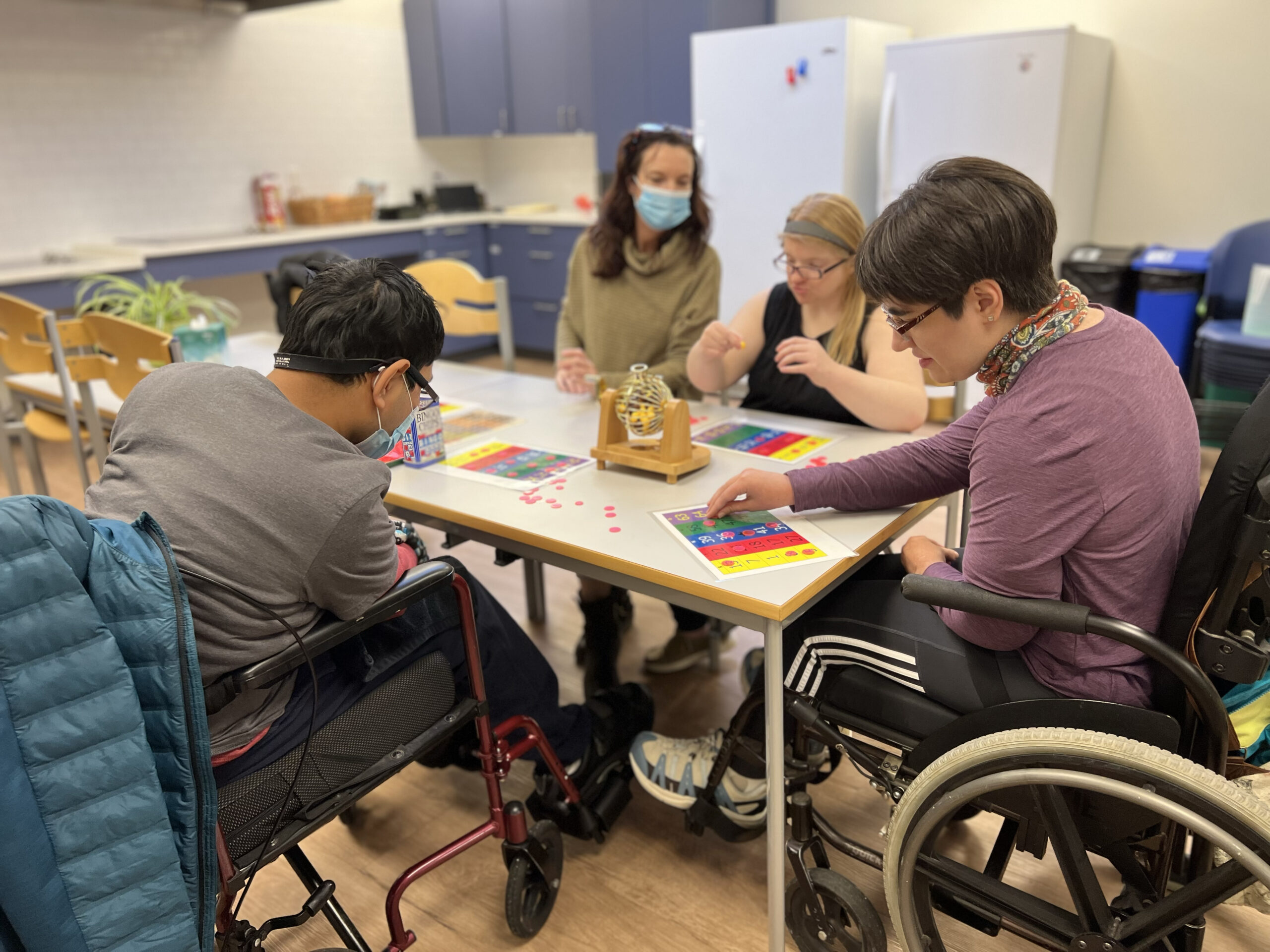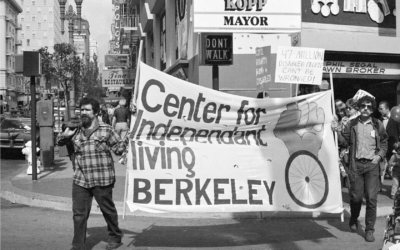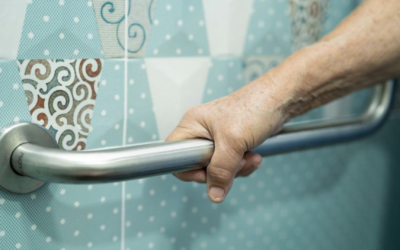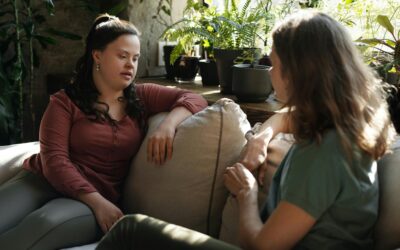(Image above: People gathered around a table together during a peer group activity)
The Independent Living Movement has transformed the lives of people with disabilities around the world. At its core is Independent Living (IL) Philosophy: the idea that people with disabilities are the best ones to make their own life choices. IL Philosophy is built upon a foundation of self-determination, equality, and empowerment. A fundamental tenet of IL Philosophy is Peer Support, the idea that people with disabilities connecting, supporting and assisting each other is at least as important as services, supports and other aspects of independent living. Peer Support is a cornerstone of IL Philosophy that empowers individuals and groups with disabilities to lead self-directed lives, overcome barriers to independent living, and achieve true independence.
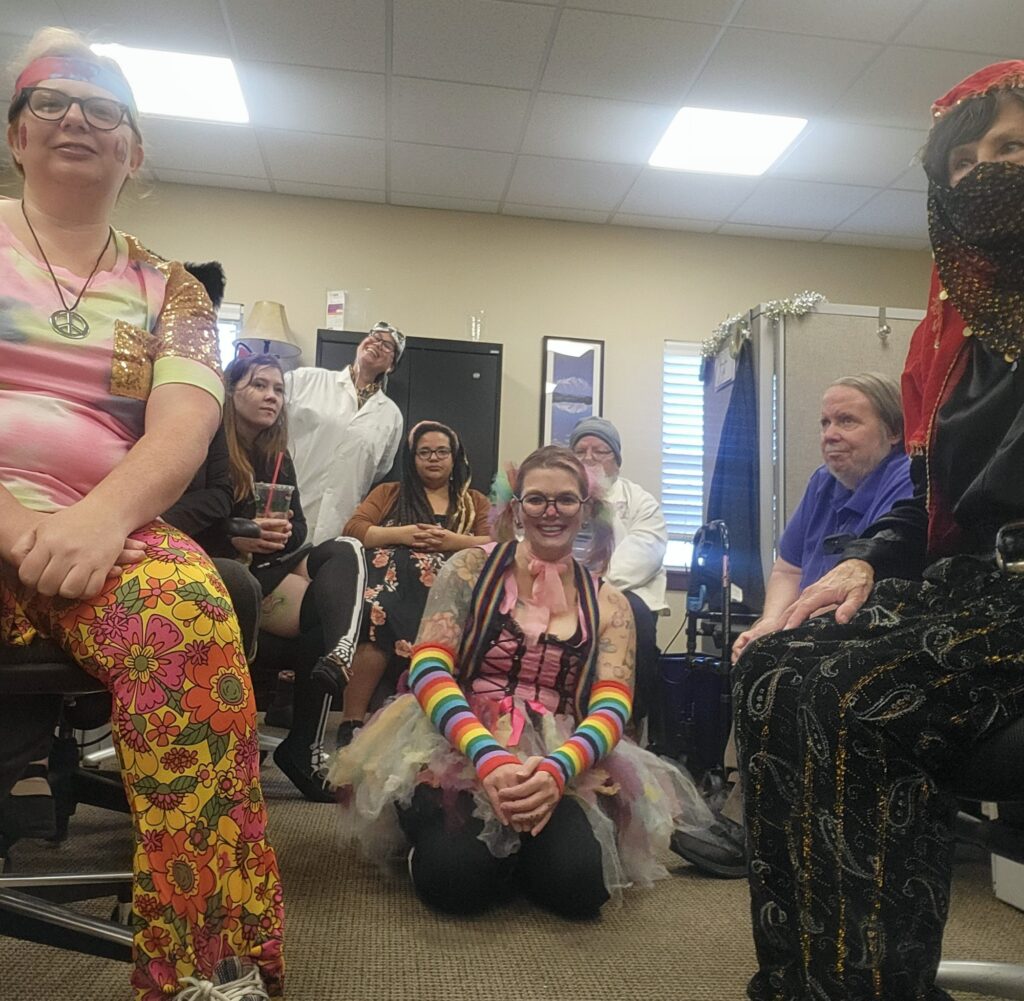
A group of consumers come dressed in costume for a Halloween-themed game day! Image description: Several people stand and sit in a semi circle while looking at the camera and smiling. They are dressed in various costumes.
As a Center for Independent Living (CIL), CPWD offers Peer Support as a Core Service. CPWD’s Peer Support groups are places where individuals with disabilities can share their experiences, address all kinds of life challenges – and triumphs – share first-hand experience about navigating challenges, make friends and feel connected, and give back to newcomers who might be facing barriers to independent living. Whether it’s mobility issues, accessibility concerns, employment obstacles, or a place to connect with others and the community, CPWD’s Peer Support offers a wide range of opportunities for people to come together and support one another. Seasoned Peer Support participants typically have not only overcome their own obstacles but have also developed a deep empathy for the struggles and triumphs their fellow community members experience, and can become positive examples and mentors.
Why Peer Support Matters
Shared Experience: Peer Support is built on the idea that individuals with disabilities understand each other’s experiences and challenges in a unique way. Peers have walked the same path and faced similar obstacles. This shared experience creates a bond that is difficult for others to replicate, fostering empathy, trust, and a sense of belonging.
Empowerment: Peer Support helps individuals recognize their strengths and abilities. Interacting with peers who have overcome challenges and achieved personal goals can be highly motivating. The encouragement and mentorship provided by peers can boost self-confidence and self-advocacy, important aspects of living independently.
Practical Advice: People with disabilities often encounter similar obstacles in daily life. Peer Support provides a platform for sharing practical advice, strategies, and solutions to address these challenges. Whether it’s navigating accessible transportation, understanding employment options, or finding the right assistive technology, Peer Support can offer invaluable insights, resources and experience.
Advocacy and Social Change: In IL Philosophy, advocacy for the rights of individuals with disabilities is paramount. Peers who have experienced discrimination and inequality first hand tend to become passionate advocates for change. They can inspire others to join in the commitment to and work for equal access, inclusion, and social justice.
Reducing Isolation: Due to marginalization and discrimination, living with a disability can sometimes lead to feelings of isolation and loneliness. Peer Support groups alleviate this isolation by providing a sense of community and friendship. It’s a space where individuals can connect, share experiences, and build meaningful relationships.
A Shift in Perspective: Traditional approaches to disability often focus on deficits and limitations. Peer Support, on the other hand, emphasizes strengths and potential. This shift in perspective is transformative, as it encourages individuals with disabilities to see themselves as capable.
Cynda’s Story
Cynda is a regular attendee at CPWD’s Peer Support groups. She encountered a significant challenge when her previous day program closed due to insufficient funding. She was determined to locate a new day program within her local area that would enable her to maintain her independence.
In her pursuit, she took a proactive approach by compiling a comprehensive list outlining the advantages and disadvantages of various day programs. She considered a range of factors, including program size, her familiarity with fellow attendees, restroom accessibility, geographical location, operating days and hours, the diversity of activities on offer, and the presence of a structured activity schedule.
Recognizing the value of the collective insight within her Peer Support group at CPWD, Cynda opted to share her list with her peers. Her intention was to gather feedback and innovative ideas from fellow group members regarding the various programs she was evaluating. The Peer Support group responded with invaluable recommendations and insights concerning the pros and cons of each program. They wholeheartedly endorsed her endeavor to identify a day program that could cater to her distinct needs and preferences. Through the support of her peers, Cynda successfully chose a new program that supports her independence.
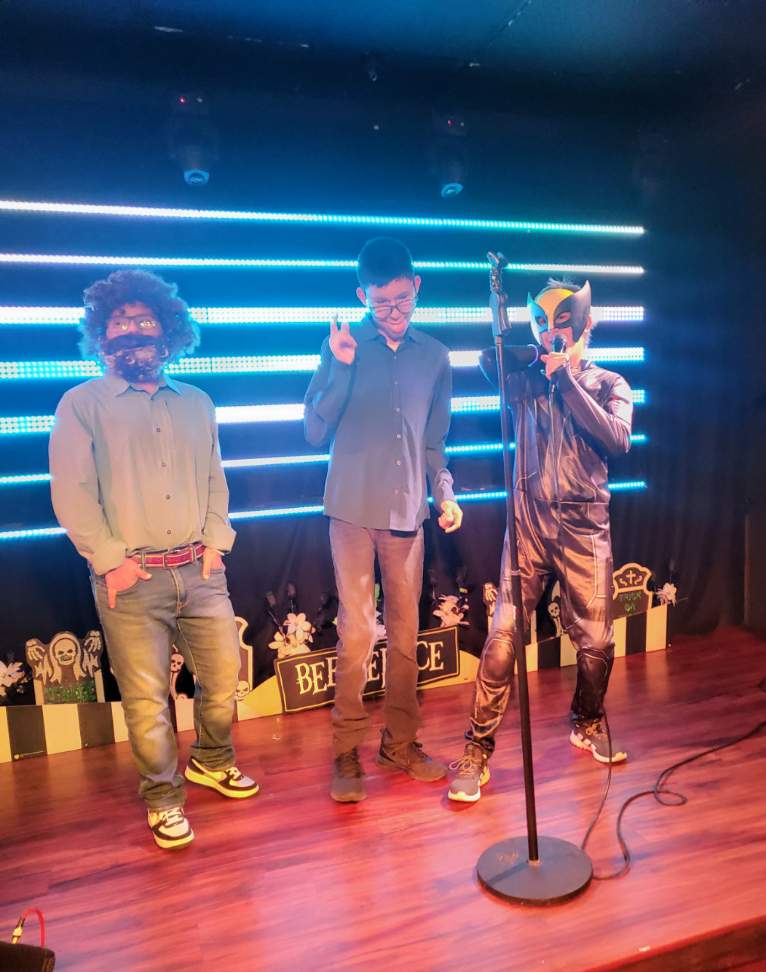
Image description: Three consumers dresses in costumes perform karaoke as part of the youth peer group karaoke night. They stand on a stage with a microphone and stand. Behind them is a wall with horizontal blue lights.
CPWD’s peer groups also offer fun activities that celebrate seasons and holidays to the delight of the consumers. This week, consumers engaged in an online and in-person game day, complete with Halloween costumes. On Wednesday the peer skills-building group held an outdoor Autumn scavenger hunt. Next week they will have a Dia de Los Muertos themed cooking class. Last week, the Youth Peer Support group had a youth karaoke night where they dressed in costumes and sang, sharing a good time together. These seasonal and recreational shared activities offer members a chance to participate in fun social activities and experience being a part of the larger community and culture.
Peer Support is a core component of IL Philosophy. It fosters empowerment, connection, and advocacy, all of which are essential for individuals with disabilities to live independently and participate fully in society. Peer Support allows people to draw strength from their shared experiences and build a community that transcends the barriers that society often imposes. CPWD is proud to offer Peer Support groups to our consumers and community as a way to foster further self-empowerment, enriched lives, and a healthy, equitable community.
If you would like to join a Peer Support group, check out our services calendar here.


